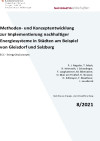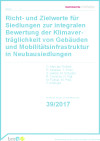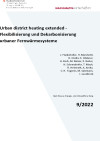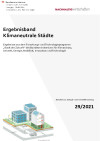Suchergebnisse
Sondierung für PV-Fassadensysteme aus leichten Kunststoff-Modulen mit reversiblen Befestigungen für Neu- und Altbauten (PV-FAS_light+easy)
Sondierung für ein neues einfaches, kostengünstiges und gebäudeintegrierbares PV-Fassaden-System aus Kunststoff-PV-Modulen durch erste Untersuchungen zur Befestigungstechnik, zur Bauphysik, zum Brandschutz und zur Elektrotechnik um die Gebrauchstauglichkeit, die Anwendbarkeitsbereiche und das Ertrags- und Anwendungspotenzial für den Neubau und für Bestandsgebäude beurteilen zu können.
Probing for PV façade systems made of lightweight plastic modules with reversible fittings for new and old buildings (PV-FAS_light + easy)
Probing for a new, simple, cost-effective and building-integrated PV facade system made of plastic PV modules through initial investigations for fixing technology, for building physics, for fire protection and for electrical engineering concerning the usability, the areas of applicability and the yield and application potentialfor new buildings and for existing buildings.
VERTICAL urban FACTORY
Das Projekt beforscht Möglichkeiten und Potenziale hocheffizienter Raumnutzung durch moderne Konzepte „gestapelter“ Funktionen und vertikaler Produktion.
VERTICALurbanFACTORY
The project researches possibilities and potentials of highly efficient use of space through modern concepts of "stacked" functions and vertical production.
Plus-Energie-Campus - Energieflexibler Plus-Energie-Campus mit Living Lab
Im Projekt Plus-Energie-Campus wurden Wege zu einem nachhaltigen, zukunftssicheren Plusenergie-Quartier (PED) im Umfeld des Standorts der Fachhochschule Technikum Wien untersucht. Dabei wurde die Machbarkeit eines neuen Universitätsgebäudes als Plusenergie-Lehrgebäude im Detail untersucht und dessen Umsetzung vorbereitet. Zentrale Innovationsinhalte sind die energetische Flexibilisierung des Neubaus und des Quartiers sowie die Konzeption des Plusenergiehauses als "Living Lab".
MehrWertStrom 2030 - PV-Gemeinschaftsanlagen: Sondierung eines partizipativen Pilotprojekts mit Mehrwert in strukturschwachen Städten
Das Projekt MehrWertStrom 2030 untersuchte die rechtliche, technische, organisatorische und wirtschaftliche Machbarkeit von PV-Gemeinschaftsanlagen auf Mehrparteienhäusern unter Bezugnahme der regionalen Wertschöpfung in strukturschwachen Regionen und erarbeitete neue Lösungsmodelle in Bezug auf Organisation, Finanzierung und Realisierung.
MehrWertStrom 2030 - PV-Community system - Exploring a participatory pilot project with regional added value for structurally weak regions
The "MehrWertStrom 2030" project analysed the legal, technical, organizational and economic feasibility of PV community joint venture facilities on multi-party buildings including the added value for structurally weak regions and developed innovative solutions related to organization, financing and realization.
EnergyCityConcepts (ECC) - Methoden- und Konzeptentwicklung zur Implementierung nachhaltiger Energiesysteme in Städten am Beispiel von Gleisdorf und Salzburg
Im gegenständlichen Projektvorhaben werden anhand zweier konkreter Modellregionen (Kleinstadt Gleisdorf und urbanes Stadtquartier Salzburg-Schallmoos) neue methodische Herangehensweisen (interdisziplinäre Energieraumplanung, Modellbildung und Simulation) entwickelt und erprobt. Die beiden Modellregionen verbindet dabei das ambitionierte politische Bekenntnis zu einer 100 % erneuerbaren bzw. CO2-neutralen Energieversorgung.
ECC – EnergyCityConcepts – Development of a methodology and concept for the implementation of sustainable energy systems in cities by the example of Gleisdorf and Salzburg
In the context of this project two concrete model regions (small city Gleisdorf and urban city quarter Salzburg-Schallmoos) will be developed and tested with new methodical approaches (interdisciplinary urban and regional energy planning, modeling and simulation). An ambitious political commitment of both model regions is a 100% renewable or rather CO2-neutral energy supply.
Green and Resilient City - Management and planning tools for a climate-sensitive urban development
The aim of the project was to provide a "proof of concept" of a control loop and tool set for the management, optimization and evaluation of green and climate-sensitive urban (district) planning- The tool set consist of urban and open space planning instruments as well as climate simulations at different scale levels.
VisErgyControl - Integrale Tages- und Kunstlichtsteuerung für hohen visuellen und melanopischen Komfort bei hoher Primärenergieeffizienz
In VisErgyControl wurde eine integrale simulationsgestützte Tages- und Kunstlichtsteuerung entwickelt. Diese geht insbesondere auf die visuellen und melanopischen Bedürfnisse der NutzerInnen (biologische Wirksamkeit von Tages- u.- Kunstlicht) ein und soll gleichzeitig den Heiz- und Kühlbedarf des Gebäudes minimieren.
VisErgyControl - Integral control system for daylight and artificial lighting for high visual and melanopic comfort with minimized primary energy consumption
Within the project VisErgyControl an integral, simulation-based, energy-efficient open loop daylight and artificial lighting control system had been developed. The research project focuses on the visual and melanopic requirements of users while minimizing the energy consumption for heating and cooling.
SmartCity Baumgarten - Demonstration eines Anergienetzes und Umsetzung von klimafitten Lösungen im Bestandsquartier
Umsetzung eines liegenschaftsübergreifenden Anergienetzes zur Versorgung mit Wärme, Kälte und Strom in einem Bestandsquartier. Mit diesem Demonstrationsprojekt wird eine technisch-rechtliche Alternative für Gebiete außerhalb von Fernwärmeversorgung entwickelt, die es ermöglicht, dass sich Nachbarschaften zusammenzuschließen um erneuerbare Energien gemeinsam zu nutzen.
SmartCity Baumgarten - Demonstration of an anergy network and implementation of climate-friendly solutions in existing districts
Implementation of a cross-property anergy network for the supply of heating, cooling and electricity in an existing neighbourhood. With this demonstration project, a technical-legal alternative for areas outside of district heating supply is developed, which makes it possible for neighbourhoods to join together to use renewable energies in common.
Grüne und resiliente Stadt - Steuerungs- und Planungsinstrumente für eine klimasensible Stadtentwicklung
Ziel des Projekts war ein „Proof of Concept“ eines Regelkreises und Tool-Sets zur Steuerung, Optimierung und Evaluierung einer grünen und klimasensiblen Stadt(teil)planung bestehend aus städtebaulichen und freiraumplanerischen Instrumenten sowie Klimasimulationen auf unterschiedlichen Maßstabsebene.
Methoden- und Konzeptentwicklung zur Implementierung nachhaltiger Energiesysteme in Städten am Beispiel von Gleisdorf und Salzburg (ECC - EnergyCityConcepts)

Im gegenständlichen Projektvorhaben werden anhand zweier konkreter Modellregionen (Kleinstadt Gleisdorf und urbanes Stadtquartier Salzburg-Schallmoos) neue methodische Herangehensweisen (interdisziplinäre Energieraumplanung, Modellbildung und Simulation) entwickelt und erprobt. Die beiden Modellregionen verbindet dabei das ambitionierte politische Bekenntnis zu einer 100 % erneuerbaren bzw. CO2-neutralen Energieversorgung.
Schriftenreihe
8/2021
P. J. Nageler, T. Mach, R. Heimrath, I. Schardinger, F. Langhammer, M. Biberacher, O. Mair am Tinkhof, H. Strasser, H. Edtmayer, F. Mauthner, I. Leusbrock
Herausgeber: BMK
Deutsch, 141 Seiten
Downloads zur Publikation
Richt- und Zielwerte für Siedlungen zur integralen Bewertung der Klimaverträglichkeit von Gebäuden und Mobilitätsinfrastruktur in Neubausiedlungen

Entwicklung und Abstimmung von Kennwerten für die energetische und ökologische Bewertung von Siedlungen auf Basis der Schweizer 2000-Watt-Arealzertifizierung. Die Ergebnisse bilden einen weiteren Baustein zum Aufbau eines Qualitätssicherungssystems für Siedlungen ähnlich der klimaaktiv Deklaration für Gebäude bzw. der e5 Zertifizierung für Gemeinden.
Schriftenreihe
39/2017
Herausgeber: BMVIT
Deutsch, 118 Seiten
Downloads zur Publikation
Urban district heating extended - Flexibilisierung und Dekarbonisierung urbaner Fernwärmesysteme

Entwicklung innovativer urbaner Fernwärmeversorgungssysteme durch Integration von Langzeitwärmespeicher, (Groß-)Wärmepumpe, solarthermische Großanlage, Abwärme und simulationstechnischer Analyse und Bewertung. Das Ergebnis dient als Vorbild für Technologieauswahl und Einsatzreihenfolge neuer urbaner Fernwärmeversorgungsgebiete.
Schriftenreihe
9/2022
J. Fladenhofer, H. Marchetti, H. Ondra, E. Höckner, H. Koch, M. Moser, P. Reiter, H. Schranzhofer, T. Mach, R. Heimrath, A. Arnitz, C. R. Tugores, M. Salzmann, I. Leusbrock
Herausgeber: BMK
Deutsch, 176 Seiten
Downloads zur Publikation
SOFC4City - SOFC-Abwärmenutzung für Gebäude und Industrie
Das hohe Abwärmetemperaturniveau der SOFC-Brennstoffzelle eignet sich prinzipiell um unterschiedliche Wärme- und Stromverbraucher (Wohnbau, Industriebetriebe, ...) bedienen zu können. Ziel ist es, die Abwärme der Brennstoffzelle auf mehreren Temperaturniveaus zur Verfügung zu stellen, um so die Vorteile der Brennstoffzelle besser zu nutzen und den Einsatz für den städtischen Bereich zu prüfen. Einerseits werden die rechtlichen und marktwirtschaftlichen Rahmenbedingungen dazu erhoben, anderseits wird die technische Ausführbarkeit mittels CFD-Simulationen der Wärmeauskopplung sondiert.
Ergebnisband „Klimaneutrale Städte"

Der vorliegende Ergebnisband stellt abgeschlossene Projekte aus dem Forschungs- und Technologieprogramm „Stadt der Zukunft“ des Bundesministeriums für Klimaschutz, Umwelt, Energie, Mobilität, Innovation und Technologie (BMK) im Bereich Klimaneutrale Städte vor. Die gewonnenen Erkenntnisse sollen eine Entwicklung in Richtung energieeffiziente und klimaverträgliche Stadt unterstützen, die auch dazu beiträgt, die Lebensqualität und die wirtschaftliche Standortattraktivität zu erhöhen.
Schriftenreihe
29/2021
Redaktionelle Gestaltung: Bianca Pfefferer, Hannes Warmuth (ÖGUT)
Herausgeber: BMK
Deutsch, 22 Seiten
